

The Next Frontier For Google Maps Is Personalization. Google Maps just won Best Mobile App at the Crunchies 2012 and Daniel Graf, Google’s director of Google Maps for mobile talked to our own Colleen Taylor after accepting the award.
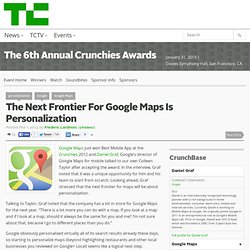
In the interview, Graf noted that it was a unique opportunity for him and his team to start from scratch. Looking ahead, Graf stressed that the next frontier for maps will be about personalization. Talking to Taylor, Graf noted that the company has a lot in store for Google Maps for the next year. People Project Their Insecurities Onto The Things They Own. 9 Trends That Are Transforming The Retail World. THE FUTURE OF DIGITAL [SLIDE DECK] Twitter-users-profile1.jpg (JPEG Image, 1200x900 pixels) - Scaled (71. Publications Turning On The "No-Collar" Workforce 03/15. Millennials in the workplace seems to be the topic d’jour in business media right now.
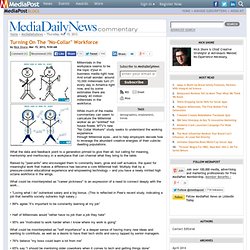
And small wonder: around 10,000 millennials turn 21 every day in America right now, and by some estimates there arealready 40 million millennials in the workforce. While much of the media commentary can seem to caricature the Millennial worker as an "entitled” hot house flower, MTV's new "No Collar Workers" study seeks to understand the working experiencethrough Millennial eyes...and to help employers decode how to leverage the abundant creative energies of their cubicle-dwelling populations. A Portrait of the Modern High-Tech Family [INFOGRAPHIC] The average modern family still has two children, two cars and two TVs, but cutting-edge gadgets are moving right on in and making themselves at home.
![A Portrait of the Modern High-Tech Family [INFOGRAPHIC]](http://cdn.pearltrees.com/s/pic/th/portrait-modern-infographic-40691971)
In fact, according to a new study by ABC's popular TV show Modern Family, families now own three mobile devices and three computers — for a total of six devices. The study was conducted on 2,000 British adults in a four-person family. SEE ALSO: Most Parents Keep Kids Calm With Mobile Devices [STUDY] “Technology plays a major part in modern households now with several TVs, computers and mobile phones owned by each family," a spokesperson for Modern Family said in a statement. “Children in particular are taking over the household gadgets, not least what’s on TV, with more than half saying it’s kids’ programs that are on screen.” For a full look at the modern high-tech family, check out the infographic below. Homepage image via iStockphoto, Goodluz.
The State Of The Internet [SLIDE DECK] The Millennial Consumer. Move aside, U.S. baby boomers.
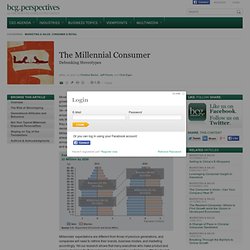
The Millennial generation is bigger than you and growing in influence. (See Exhibit 1.) Now numbering 79 million (compared with the boomers’ 76 million), U.S. Millennials and Cause: Seven Things We Learned from 5,493 People. Millennials care about causes and are more likely to show a preference toward products from companies which support causes—even if it means paying a bit more for those items.
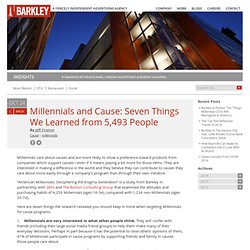
They are interested in making a difference in the world and they believe they can contribute to causes they care about more easily through a company’s program than through their own initiative. “American Millennials: Deciphering the Enigma Generation” is a study from Barkley in partnership with SMG and The Boston Consulting Group that examined the attitudes and purchasing habits of 4,259 Millennials (ages 16-34), compared with 1,234 non-Millennials (ages 35-74).
Here are seven things the research revealed you should keep in mind when targeting Millennials for cause programs: 1. Millennials are very interested in what other people think. Q » Please indicate how much you agree or disagree with the following statements. 2. 3. The Millennial Consumer. Move aside, U.S. baby boomers.
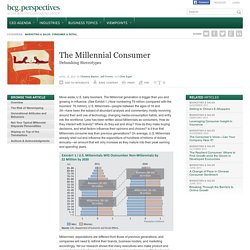
Press Release - Study Highlights Distinctive Buying Behaviors and Attitudes of U.S. Millennials. BOSTON, April 16, 2012—America’s Millennials have been the subject of abundant research and commentary, mostly revolving around their avid use of technology, changing media-consumption habits, and entry into the workforce.

A new study reveals surprising insights about this generation as consumers. In contrast to their reputation as a lazy, entitled generation, U.S. Bcg-tech-adoption-generations-april2012.jpg. Consumer Attitudes to Local Search Reveal Problems and Opportunities for Brands.
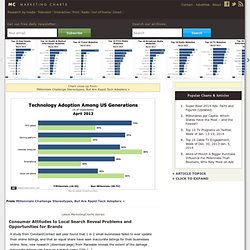
Techies: They're everywhere. Techies: They're everywhere By Mindy Fetterman and Barbara Hansen, USA TODAY When you think of people who are technologically savvy, you probably envision a hip young guy in Seattle or Silicon Valley or New York, sitting in a coffee shop and sending e-mail from his laptop or PDA or even his cell phone.
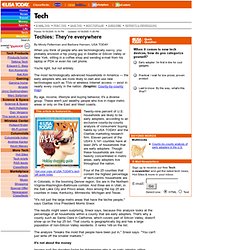
You're right, but not entirely. The most technologically advanced households in America — the early adopters who are more likely to own and use new technologies such as TiVo or wireless Internet access — exist in nearly every county in the nation. (Graphic: County-by-county map) By age, income, lifestyle and buying behavior, it's a diverse group. Twenty-nine percent of U.S. households are likely to be early adopters, according to an exclusive county-by-county analysis of consumers' buying habits by USA TODAY and the Claritas marketing research firm.
Four of the 25 counties that contain the highest percentage of tech-centric households are in Colorado, in the booming Denver region. The Millennial Generation: Pro-Social and Empowered to Change the World. Posted April 23, 2010by AMP Agency; Cone Inc., AMP Agency White Paper A collaboration between Cone Inc. and AMP brought together two unique and valuable perspectives to create the compelling and significant Millennial Cause Study.
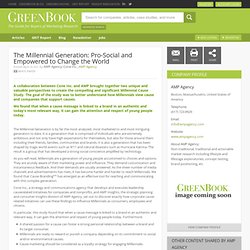
The goal of the study was to better understand how Millennials view cause and companies that support causes. Consumer Electronics: Baby Boomers Spend Most on Tech. How Does Discretionary Income Change Over a Lifetime? How Discretionary Income Changes During A Lifetime [Infographic] Tcb-discretionary-income-household-stats.jpg.
Consumer Attitudes to Local Search Reveal Problems and Opportunities for Brands A study from ConstantContact last year found that 1 in 2 small businesses failed to ever update their online listings, and that an equal share have seen inaccurate listings for their businesses online. Now, new research [download page] from Placeable reveals the extent of the damage inaccurate listings can have on a brand: some 73% […] Read more » African-Americans and Hispanics Combine For One-Fifth of Estimated National Discretionary Spending Together, African-Americans (9%) and Hispanics (11.3%) combined to account for one-fifth of national discretionary spending during the Fall of 2013, according to new data from Experian Marketing Services’s Fall 2013 National Consumer Study.
Read more » 2013 Rich Media Ad Benchmarks, by Vertical. Milliennials Are Big (Discretionary) Spenders. Posted on June 5, 2012 Despite the fact that Millennials have the highest rate of unemployment of any generation and are deeply in debt, they still use a big chunk of whatever money they have on discretionary and even luxury spending. According to one marketing agency, the average Millennial spends $784 a month on discretionary expenses like entertainment and eating out.
Data Points: News Division. With people increasingly getting their news on the go, the Donald W. Reynolds Journalism Institute surveyed mobile media users on their attitudes towards news sites. The good news for journalists is, mobile users, like consumers overall, place a high value on news that's produced by the professionals (63 percent).
They have a higher preference for news that interests them (48.3 percent versus 44.1 percent of consumers overall). Attitudes towards advertising also differ slightly, with mobile media users less likely to consider ads to be of value. When it comes to the future of mobile news, consumers are divided, but mobile users are more likely to believe they'll rely on their devices for all their news in the next 10 years. The US 20.